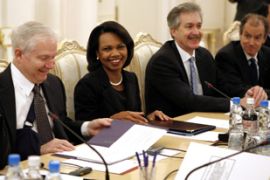No agreement in US-Russia talks
US puts a positive tone on missile defence talks in Moscow.

“We had a positive spirit yesterday. We look forward to further work today, to having greater details so that perhaps we can strengthen our partnership and overcome some of our differences,” Rice said.
Rice also reiterated concerns on what the US could do to “make this a more open and participatory political system” and encourage economic and entrepreneurial development.
Both Rice and Sergey Lavrov, Russian Foreign Minister found the discussions useful, however, no agreements had been made toward deploying missile defense facilities in Poland and the Czech Republic, a plan Russia continues to oppose.
Attending the meeting was long-time political opposition figure Grigory Yavlinsky, head of the liberal Yabloko Party.
He was one of the opposition candidates who pulled out of Russia‘s presidential contest in protest, leaving a nearly clear field for Putin’s protege, Dmitry Medvedev, who won handily earlier this month.
Opposition leader Garry Kasparov was not invited to the meeting between Rice and prominent Russians outside the government.
While urging the United States to be more critical of the Putin administration, he says Rice did not want to meet with people who are actively working to unite Russia‘s opposition.
Defense Planning
During talks, Russia repeatedly warned against the US plans to place a missile defense radar in the Czech Republic and linked interceptor missiles in Poland, viewing them as a threat to Russia.
The US insists the facilities are not directed against Russia but against unfriendly states such as Iran and North Korea.
While Putin is expected to retain major influence after taking up the post of prime minister, this week’s meetings were a first chance for both countries to see at first hand the transition under way after a March election won by Putin’s long-time ally Medvedev.
Political analyst Fyodor Lukyanov said he doubted Gates’ statement that agreement on missile defense could be achieved under the Bush administration because both sides were in a holding position dictated by domestic politics.
“The Russian side can expect the new administration to at least re-evaluate” the project.
“Not that the Americans will cancel this project but at least change some of the approaches,” said Lukyanov, who edits the journal Russia in Global Affairs.
For their part, Medvedev and Putin are going through a delicate period of transition, in which neither man will want to make major declarations, he said.
Before the US delegates met for missile defense talks, Bush had sent Putin a letter framing the discussions of Tuesday’s talks, asking participation in the unusual session hinged on Putin’s agreement.
“The president wanted to assess whether there was openness to cooperation on some of these issues that have been difficult, like missile defense,” Rice told reporters afterward.
“He wanted to see whether President Putin is really interested in pursuing progress on a number of fronts.”
When Medvedev is inaugurated as president on May 7, he will formally inherit the considerable powers of the office as spelled out in the constitution. Some experts predict he will serve a lengthy apprenticeship before actually using those powers, while others wonder if he will ever use them.